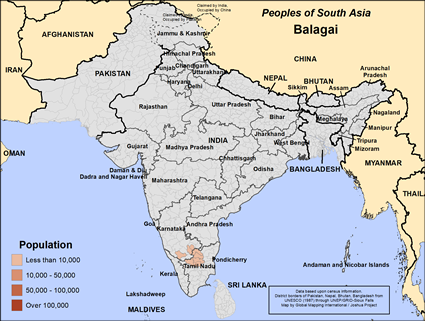Balagai in India

Send Joshua Project a photo
of this people group. |

Map Source:
People Group data: Omid. Map geography: UNESCO / GMI. Map Design: Joshua Project
|
| People Name: | Balagai |
| Country: | India |
| 10/40 Window: | Yes |
| Population: | 8,600 |
| World Population: | 8,600 |
| Primary Language: | Kannada |
| Primary Religion: | Hinduism |
| Christian Adherents: | 0.00 % |
| Evangelicals: | 0.00 % |
| Scripture: | Complete Bible |
| Ministry Resources: | Yes |
| Jesus Film: | Yes |
| Audio Recordings: | Yes |
| People Cluster: | South Asia Hindu - other |
| Affinity Bloc: | South Asian Peoples |
| Progress Level: |
|
Introduction / History
The Balagai or Chalavadi are an indigenous people who live in the south India states of Karnataka and Tamil Nadu. The Balagai call themselves a right-handed, Dravidian community. They were formerly hunter-gatherers but now they have settled down to live in villages. Most of the Balagai now work in agriculture and animal husbandry. Most Balagai are illiterate or functionally illiterate. Most Balagai children have to quit school after a few years to help support their families.
The Balagai are a Scheduled Caste meaning they are eligible for public jobs and special consideration for university admissions.
The main language of the Balagai is Kannada. Some also speak Telugu and Tamil. Many Christian resources are available in all three languages including the whole Bible and the JESUS Film.
Where Are they Located?
The Balagai live in the Karnataka and Tamil Nadu, states in South India.
What Are Their Lives Like?
The Balagai live in rural villages often without electricity, indoors plumbing and access to modern medical care. Life expectancy is short. Crop failure can lead to starvation in the Balagai community. They are a tribal people outside of the Hindu caste system. Other Indians tend to look down on tribal peoples due to their lack of education and animistic ways.
The main foods of the Balagai are rice, grains, vegetables, and dairy products. As Hindus, they will not eat beef. Meat is frequently reserved for special occasions and holidays. The Balagai sell their produce, meat, hides, and milk to get cash to buy things they cannot make for themselves like tools, weapons and farm equipment.
The Balagai marry within their group. Families arrange marriages with the consent of the young people. Marriage to one spouse is the norm.
What Are Their Beliefs?
The Balagai practice Hinduism heavily influence by ethnic religion. They pay special devotion to Shiva, destroyer god. They worship and serve the gods of the Hindu pantheon. Hindus believe that by performing rituals and good works that they will attain moksha or freedom from the endless cycle of birth, death and rebirth. The Balagai visit Hindu temples and offer prayers, food, flowers, and incense to their gods in hopes of gaining protection and benefits. They do not have a personal or familial relationship with their gods like Christians or Jews. There are many forms of Hinduism, each with its own deities and beliefs. The Balagai believe that evil spirits inhabit the forces of nature. The village shaman performs magic ceremonies and rituals to appease the evil spirits.
The main yearly holidays of the Balagai people are Holi, the festival of colors and the start of spring, Diwali, the festival of lights, Navratri, the celebration of autumn and Rama Navami, Rama's birthday.
What Are Their Needs?
Solar panels can bring electricity to Balagai villages. The Balagai children need more than a basic primary education to compete in the contemporary Indian economy. The Balagai need access to modern medical care and clean water. Most of all the Balagai need to hear and understand the message of Jesus Christ. He alone can forgive their sins and deliver them from their fear of evils spirits.
Prayer Points
Pray that persons and households of peace will be found among the Balagai people who will catalyze movements to Jesus among their own people.
Pray the Lord will start a movement of Balagai families experiencing God's blessings.
Pray that the Lord will overthrow the powers of darkness that are preventing the Balagai from accepting His truth.